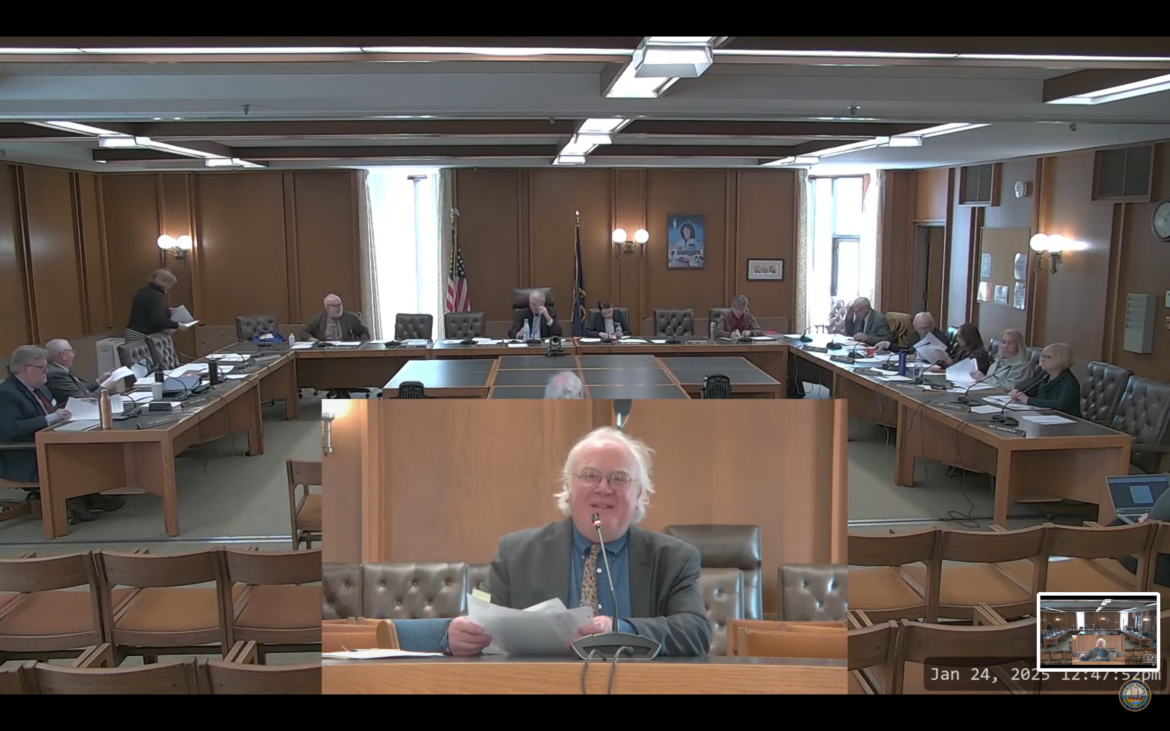By GARRY RAYNO, InDepthNH.org
CONCORD — Public tax dollars should not fund a religious education, the House Education Funding Committee was told Friday.
“(The Education Freedom Account) program doesn’t merely allow state taxpayer funds to be used to support religious education,” said the prime sponsor of House Bill 549, Rep. Timothy Horrigan, D-Durham, “it actively encourages it.”
Horrigan, who was the only person to testify on the bill, also charged that the company that administers the program’s — The Children’s Scholarship Fund NH — main mission is to support religious education.
“CSF NH’s own public-relations materials state very explicitly that they favor spending public money on religious education,” Horrigan said. “Their Concord office is literally located on the property of a Catholic church on Loudon Road.”
HB 549 would prohibit state grant money from the EFA program from going to religious schools, which it does currently.
Religious schools receive the bulk of the EFA grant money that goes to private schools, including nine of the top 10 recipients of EFA grants. Horrigan said religious schools receive 86 percent of the money going to private schools, while secular schools receive 14 percent.
About 75 percent of the students participating in the EFA program were in private and religious schools, or homeschooled before joining the program, and did not leave public schools to participate in alternative educational opportunities.
“I am not opposed to religious education per se, but using taxpayer dollars to support such education is a blatant violation of Part First Article 6,” Horrigan said. “Using taxpayer dollars for that purpose is also bad policy, for many reasons. To name just one reason, the EFA program gives the government the power to reward some religions which it approves of while punishing those it disapproves of.”
Although no other person testified at the public hearing, the committee did receive electronically filed testimony from a number of people, almost all of it in favor of the bill.
The Roman Catholic Diocese of Manchester opposed the bill, saying the U.S. Supreme Court has already spoken on the issues in Espinoza v. Montana Department of Revenue ruling the state’s constitutional “no-aid” provision unlawfully discriminated against religious schools and the families who wish to attend those schools. “The Free Exercise Clause protects religious observers against unequal treatment and against laws that impose special disabilities on the basis of religious status,” the court ruled in 2020.
“The Court recognized that the Montana provision barring aid to religious schools plainly excluded the schools from governmental aid ‘solely because of their religious status,’ and that the application of that no-aid provision therefore contravened the First Amendment. Id. HB 549 would do exactly what the Montana amendment at issue in Espinoza did. Like the Montana amendment, HB 549 would expressly disqualify religious schools solely because of their religious status. Thus, HB 549 would violate the First Amendment,” wrote Robert Dunn, the dioceses Director of the Office of Public Policy.
The Espinoza v. Montana Department of Revenue decision concerned what is called the Blaine Amendment championed by James Blaine, a 19th Century Maine politician, who had hoped to ride its popularity into the White House.
The amendment failed to qualify to be placed in the US Constitution, but many states, including New Hampshire, adopted it.
The section of the constitution referenced by Horrigan is separate from the amendment and some claim continues to prevent taxpayer dollars from being used to fund a religious education.
The amendment forbids any taxpayer from being compelled to support the religious teachings of any sect or denomination.
Many people writing to support the bill noted that the state should first fully fund public education which serves 90 percent of the students in the state before putting money into religious schools or other aspects of the EFA program.
William Farnum of Tamworth wrote “Fund PUBLIC EDUCATION first. The funds for EFA take money that is needed in the public schools which are under-funded by the state. Local property taxes are getting out of control for education. Tax dollars going to religious schools have to be made up by local property taxes.”
And Jean Lewandowski of Nashua wrote “This bill reflects the clearly-stated constitutional prohibition against tax dollars being used for religious education. The fact that they have been laundered through the EFA scheme doesn’t change the reality that public dollars are being used in constitutionally prohibited ways.”
The bill also would require that EFA grants used for higher education be used at an accredited institution and also remove various special legal protections granted to EFA recipients and to the scholarship organization.
“If this bill passes, when you use the EFA program to violate the law or to violate anyone else’s constitutional or common-law rights,” Horrigan said, “you could be held liable just like anyone else who misuses the taxpayers’ money.”
According to the electronic filing system, 95 people supported the bill and 19 opposed it.
Several members of the committee said they needed to hear from the Children’s Scholarship Fund NH and from the Department of Education before making a recommendation on the bill, but Committee Chair Rick Ladd, R-Hanover, said he did think he would appoint a sub-committee to work on the bill, noting the committee had a significant amount of work to do on other issues like special education.
“We all know where this bill is going,” Ladd said, but several members continued to push for a sub-committee.
A similar bill was killed last year.
Garry Rayno may be reached at garry.rayno@yahoo.com.





